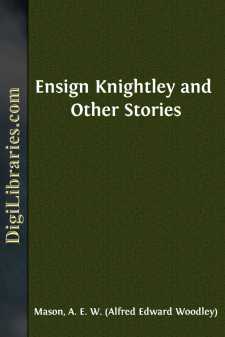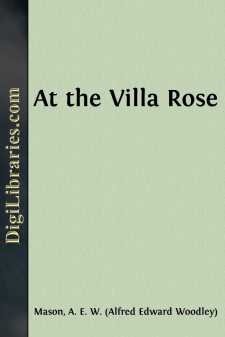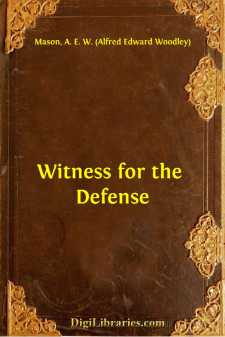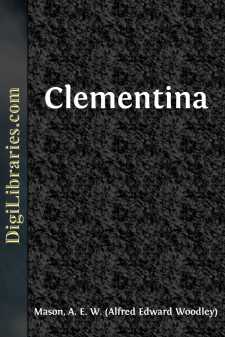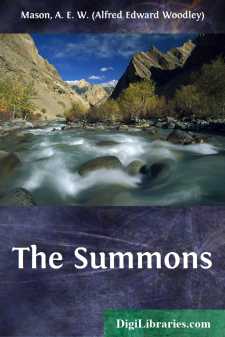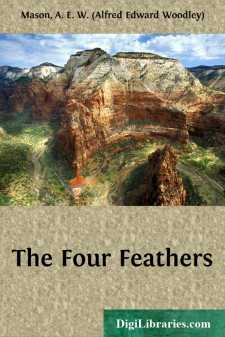Categories
- Antiques & Collectibles 13
- Architecture 36
- Art 48
- Bibles 22
- Biography & Autobiography 813
- Body, Mind & Spirit 142
- Business & Economics 28
- Children's Books 17
- Children's Fiction 14
- Computers 4
- Cooking 94
- Crafts & Hobbies 4
- Drama 346
- Education 46
- Family & Relationships 57
- Fiction 11829
- Games 19
- Gardening 17
- Health & Fitness 34
- History 1377
- House & Home 1
- Humor 147
- Juvenile Fiction 1873
- Juvenile Nonfiction 202
- Language Arts & Disciplines 88
- Law 16
- Literary Collections 686
- Literary Criticism 179
- Mathematics 13
- Medical 41
- Music 40
- Nature 179
- Non-Classifiable 1768
- Performing Arts 7
- Periodicals 1453
- Philosophy 64
- Photography 2
- Poetry 896
- Political Science 203
- Psychology 42
- Reference 154
- Religion 513
- Science 126
- Self-Help 84
- Social Science 81
- Sports & Recreation 34
- Study Aids 3
- Technology & Engineering 59
- Transportation 23
- Travel 463
- True Crime 29
A. E. W. (Alfred Edward Woodley) Mason
Alfred Edward Woodley Mason was a British author and politician, born on May 7, 1865, and died on November 22, 1948. He is best known for his adventure novel "The Four Feathers," which has been adapted into several films. Mason also wrote detective fiction, creating the character Inspector Hanaud, one of the first French detectives in literature.
Author's Books:
Sort by:
ENSIGN KNIGHTLEY. It was eleven o'clock at night when Surgeon Wyley of His Majesty's ship Bonetta washed his hands, drew on his coat, and walked from the hospital up the narrow cobbled street of Tangier to the Main-Guard by the Catherine Port. In the upper room of the Main-Guard he found Major Shackleton of the Tangier Foot taking a hand at bassette with Lieutenant Scrope of Trelawney's...
more...
CHAPTER I It was Mr. Ricardo's habit as soon as the second week of August came round to travel to Aix-les-Bains, in Savoy, where for five or six weeks he lived pleasantly. He pretended to take the waters in the morning, he went for a ride in his motor-car in the afternoon, he dined at the Cercle in the evening, and spent an hour or two afterwards in the baccarat-rooms at the Villa des Fleurs. An...
more...
CHAPTER I HENRY THRESK The beginning of all this difficult business was a little speech which Mrs. Thresk fell into a habit of making to her son. She spoke it the first time on the spur of the moment without thought or intention. But she saw that it hurt. So she used it again—to keep Henry in his proper place. "You have no right to talk, Henry," she would say in the hard practical voice which...
more...
CHAPTER I THE BREAKING OF THE ROAD It was the Road which caused the trouble. It usually is the road. That and a reigning prince who was declared by his uncle secretly to have sold his country to the British, and a half-crazed priest from out beyond the borders of Afghanistan, who sat on a slab of stone by the river-bank and preached a djehad. But above all it was the road—Linforth's road. It...
more...
CHAPTER I Hugh Fielding, while speculating upon certain obscure episodes in the history of a life otherwise familiar to an applauding public, and at a loss to understand them, caught eagerly at a simile. Now Fielding came second to none in his scorn for the simile as an explanation, possibly because he was so well acquainted with its convenience. 'A fairy lamp' he would describe it, quite...
more...
CHAPTER I The landlord, the lady, and Mr. Charles Wogan were all three, it seemed, in luck's way that September morning of the year 1719. Wogan was not surprised, his luck for the moment was altogether in, so that even when his horse stumbled and went lame at a desolate part of the road from Florence to Bologna, he had no doubt but that somehow fortune would serve him. His horse stepped gingerly...
more...
CHAPTER I SHOWS MRS. THESIGER IN HER HOME The Geneva express jerked itself out of the Gare de Lyons. For a few minutes the lights of outer Paris twinkled past its windows and then with a spring it reached the open night. The jolts and lurches merged into one regular purposeful throb, the shrieks of the wheels, the clatter of the coaches, into one continuous hum. And already in the upper berth of her...
more...
CHAPTER I The Olympic Games "Lutrell! Lutrell!" Sir Charles Hardiman stood in the corridor of his steam yacht and bawled the name through a closed door. But no answer was returned from the other side of the door. He turned the handle and went in. The night was falling, but the cabin windows looked towards the north and the room was full of light and of a low and pleasant music. For the tide...
more...
A CRIMEAN NIGHT Lieutenant Sutch was the first of General Feversham's guests to reach Broad Place. He arrived about five o'clock on an afternoon of sunshine in mid June, and the old red-brick house, lodged on a southern slope of the Surrey hills, was glowing from a dark forest depth of pines with the warmth of a rare jewel. Lieutenant Sutch limped across the hall, where the portraits of the...
more...


